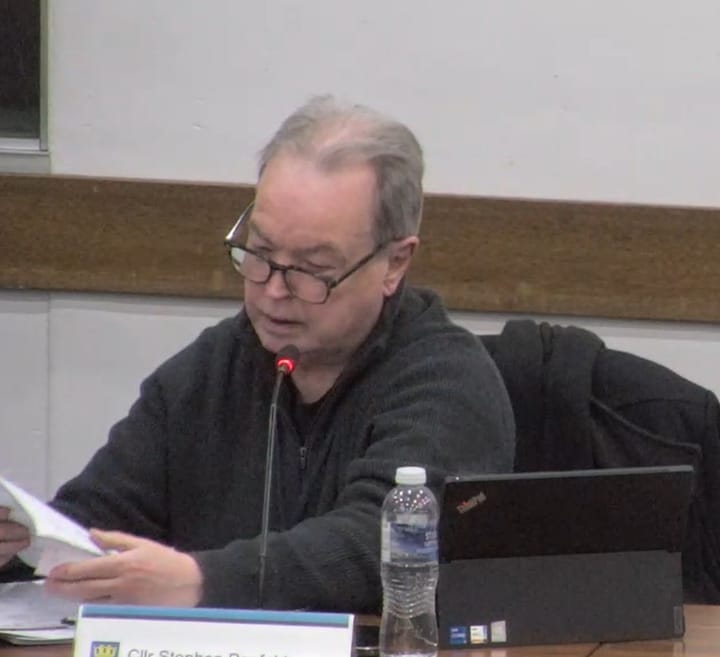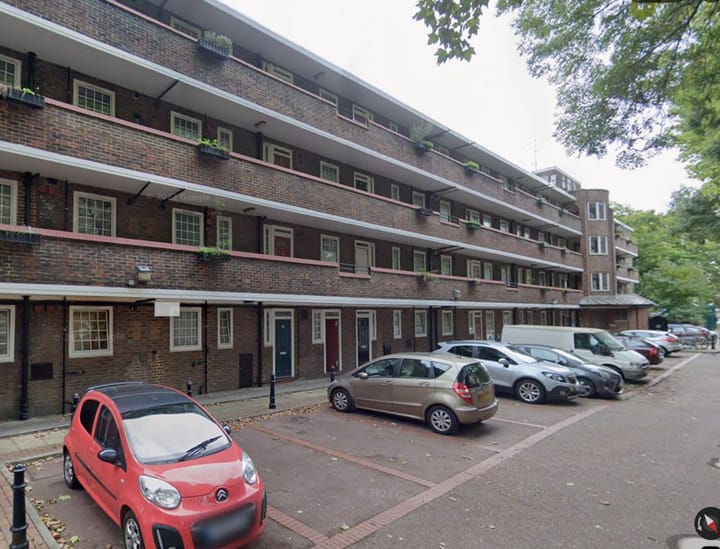Disposable vapes - is the ban working?
Mike Keogh and Paul de Zylva from Quaggy Waterways Action Group (QWAG) spent a year cleaning up discarded vapes across Lewisham. Mike argues that the environmental damage caused by vapes is much worse than the old non-biodegradable cigarette butt. Is the new ban working?
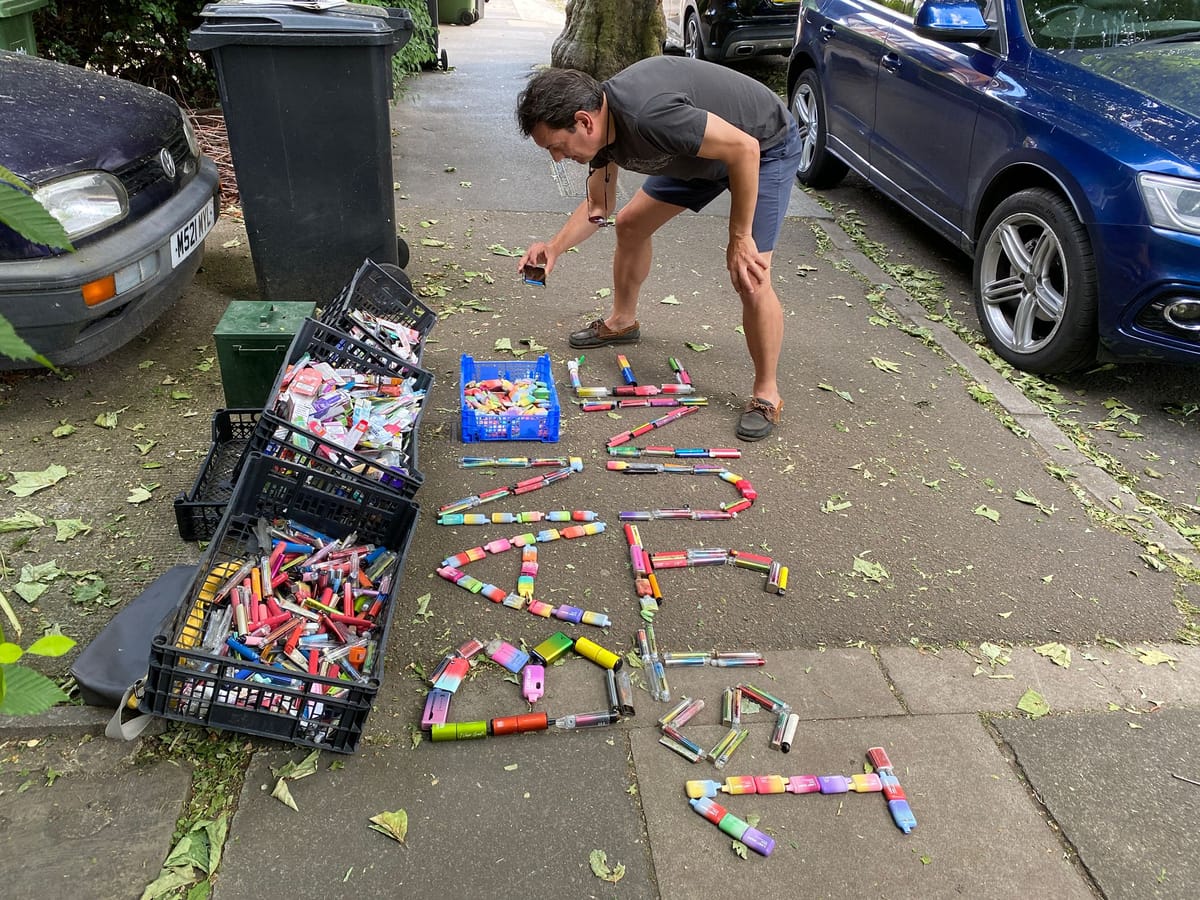
Paul and I started highlighting the issue of disposable vapes last year, as so many discarded vapes (and their packaging) were ending up in gutters around Lewisham.
Disposable vapes contain lithium-ion batteries, which brings them under the UK Waste Electrical and Electronic Equipment (WEEE) regulations.
Technically, shops must take back vapes one-for-one if you purchase one, or have dedicated vape bins for returned vapes of any kind. Some supermarkets have these.
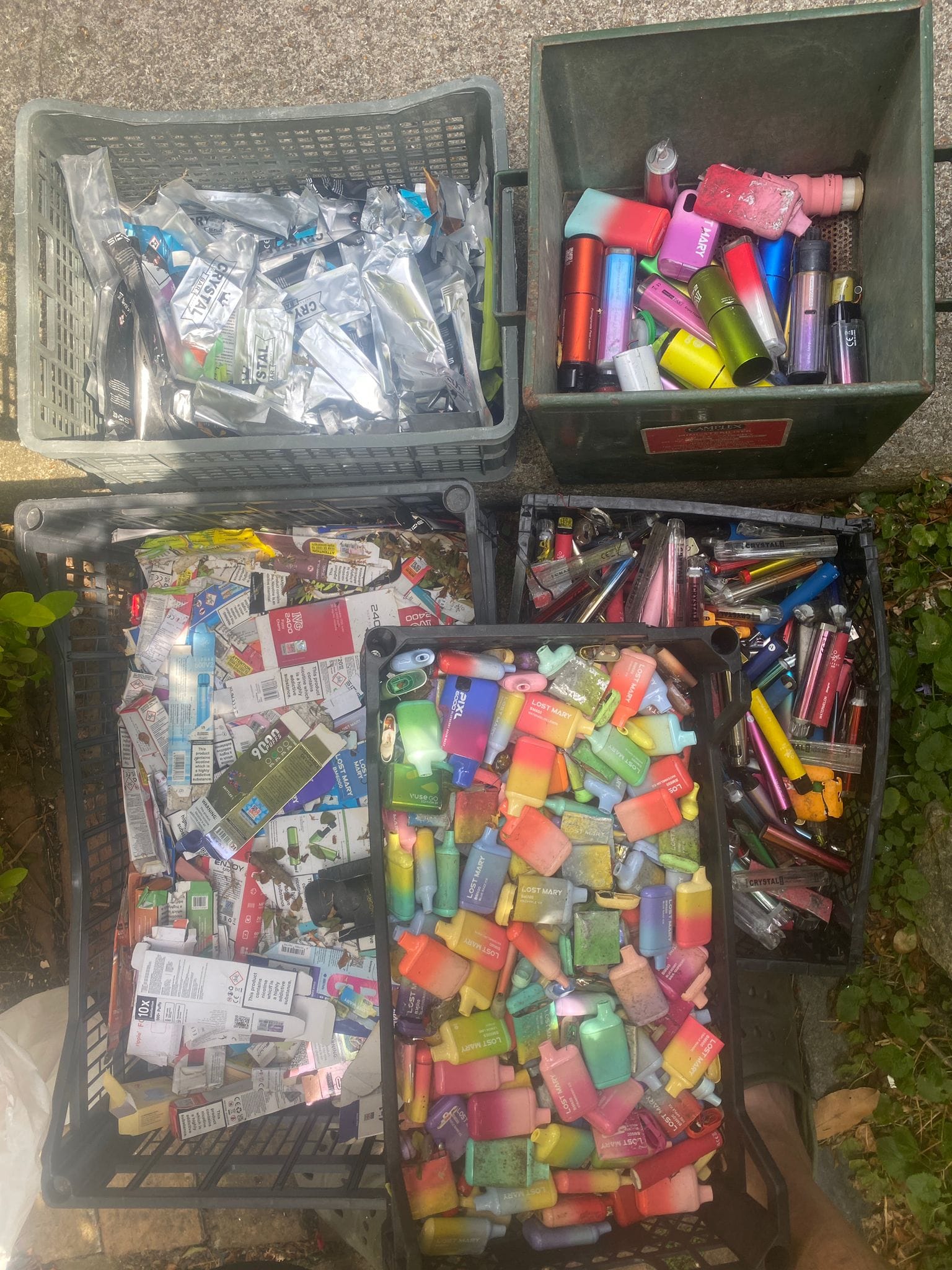
We built up sizeable collections of disposable vapes, associated packaging and their small plastic attachments over the year. Often the vapes had been crushed (by cars) and were rusty and leaking, with their associated parts rolling round nearby.
We stored them at our homes at our own risk - reports of vapes spontaneously combusting were circulating on social media! But apparently their terminals are internal so that they cannot short circuit in the dedicated supermarket vape bins.
Paul de Zylva is chair of QWAG and I'm vice-chair; QWAG was started to protect and restore Lewisham's river Quaggy, for the benefit of people and nature.
Lewisham was founded on the confluence of two chalk streams, the Quaggy and the Ravensbourne. Chalk streams are rare and fragile, there are only around 200 globally and 85% of them are found in southern and eastern England.
QWAG is concerned that discarded vapes not only clog up the sewer filter/screening systems, increasing flood risk, but also leach lithium into watercourses via storm outflow surges or sewage works, and potentially on to drinking water.
The consequences for wildlife are unknown.
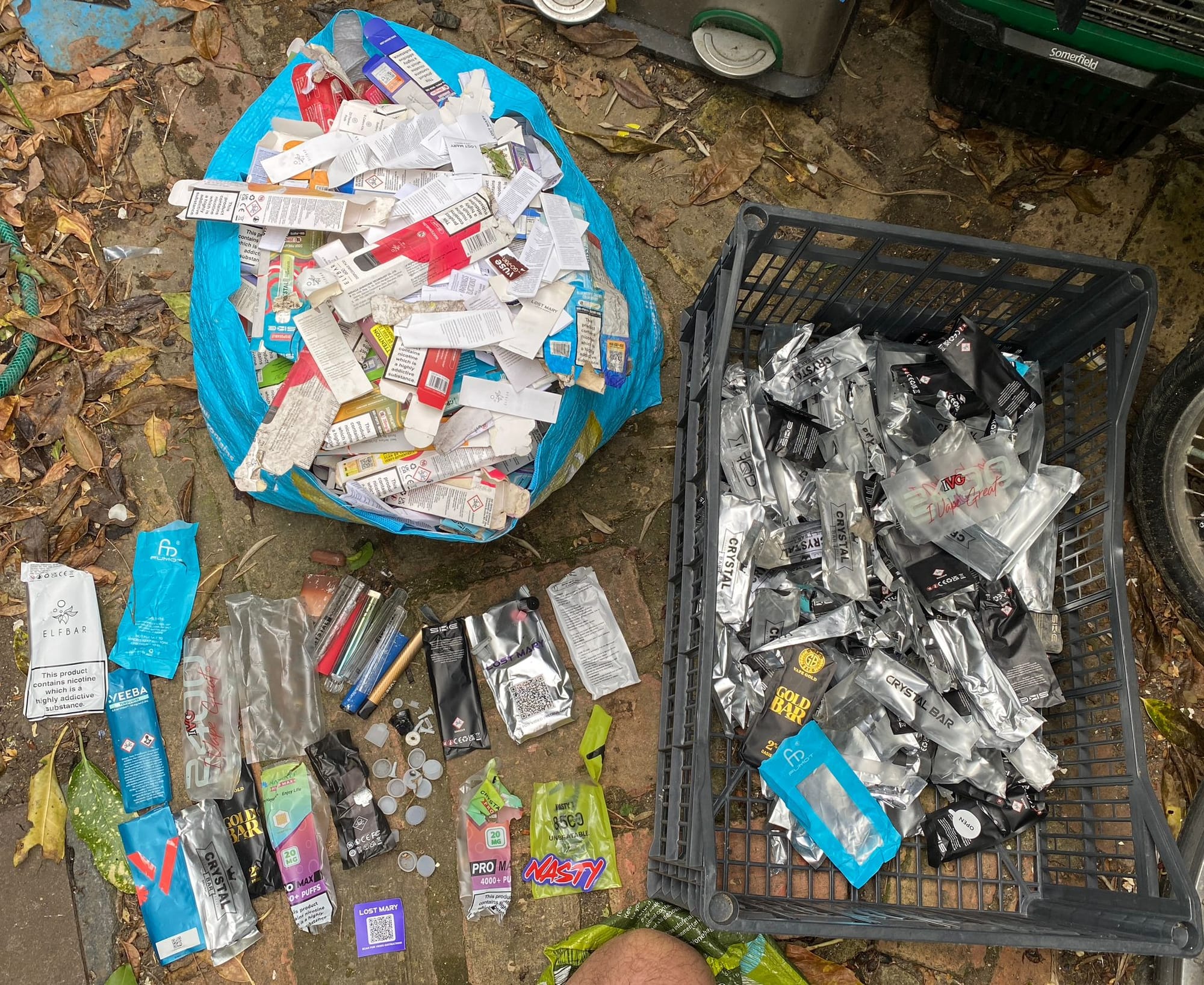
The plastic casing and metalised plastic sleeves also have the potential to block filters or screens, and break down into microplastic particles.
Vapes are environmental nightmares, much worse than discarded cigarette butts with their non-biodegradable filter tips.
In addition, the mining of lithium is causing social and environmental problems in some countries, including high water use and pollution in extraction.
One look at vape packaging shows that they are being sourced from China, which supplies the world and undercuts any domestic producers. Vapes have flooded into the UK; we have the second highest number of vape users per capita in the world!
Many tested vapes were found to have above labelled or legal limits of nicotine in them, increasing addiction behaviour and potentially the long-term costs for the NHS.
There is no tax on vapes at the moment except VAT, but this revenue could be passed back to councils to help them deal with the problems vapes have created. And a new duty for each 10 ml volume of e-liquid is due to start in October 2026.
There has been pushback from the vape industry, arguing that nicotine strength and amount found in the liquid should be taxed instead.
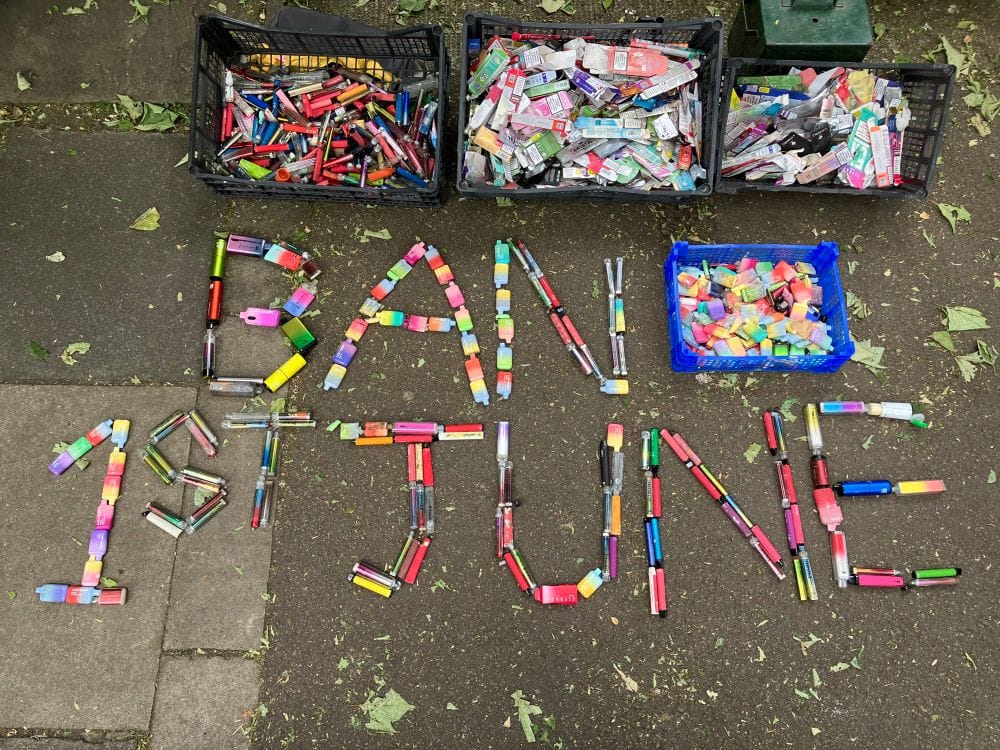
So the ban seems to be working. Or is it?
Since the disposable vape ban, we have been finding fewer of these polluting items in the streets. Volunteers with Nature's Gym in Lewisham also report finding fewer disposable vapes in the rivers when doing clean ups. (Although electric hire bikes, with their huge lithium-ion batteries, are still being thrown in.)
But a recent mystery shopper exercise by the Financial Times found old style disposable vapes are still on sale. It also found that although new style reusable vapes are well stocked with high sales, vape shops held much lower stock of refill cartridges, indicating that they are not being sold in comparable amounts.
The report suggested the refillable vape initial price is so close to the disposable vape price that people can still treat the refillable vape as disposable.
Since the ban, importers are not permitted to import disposable vapes. Paul has posted, asking whether Lewisham council's Trading Standards Enforcement department would be able to enforce the law, and prosecute sellers who are ignoring it by trying to get rid of their old stock.
We believe the risk to Lewisham's fragile chalk streams, the Quaggy and the Ravensbourne, and all the creatures that depend on them, is high and this warrants raising this as a question to full council.
The health consequences of vaping are still relatively unknown - for this new product, marketed as both a “cure for smokers” and to be highly desirable to children, this is extremely worrying.
Who knows what the flavours do to our physiological systems? Who knows what the breathed-out puffs do to wildlife?
There are even reports of animals eating discarded vapes.
What do the volatile flavour chemicals do to soil flora, fauna, bacterial and fungal species?
There has been a marked decrease recently in invertebrates, including bees, butterflies and other pollinators. I suspect vaping, household spray products and our increasing use of these synthetic chemicals may contribute to this decline, especially in urban areas.
Why would I want my house smelling of artificial pine forests anyway? Or my vape of strawberries? Don’t we want happy fish in our rivers, estuaries and oceans?
Mike Keogh is chair of Lewisham Biodiversity Partnership, vice-chair of QWAG and was a Green Party councillor for Ladywell ward, Lewisham from 2006 - 2010.

